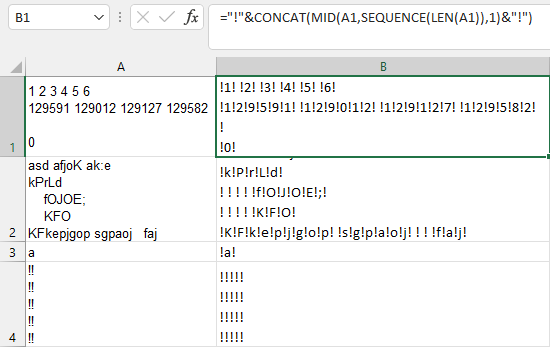Posted from here.
This challenge is highly "distilled" from this question. Special thanks to @Akababa!
In this task, you should insert an exclamation mark at the start of the string and after every character.
Rules
- There will always be a non-empty-string input. The input will not contain tabs either. You can assume that the input only contain non-extended ASCII printable characters and newlines.
- The input will not contain trailing newlines as long as your language can't detect a newline.
- This is a code-golf contest; the shortest answer should win.
Examples
- 4 newlines result in 5 newline-delimited exclamation marks. It is very hard to put this as a Markdown text, so this is stated instead.
1 2 3 4 5 6 129591 129012 129127 129582 0
Outputs
!1! !2! !3! !4! !5! !6! !1!2!9!5!9!1! !1!2!9!0!1!2! !1!2!9!1!2!7! !1!2!9!5!8!2! ! !0!
asd afjoK ak:e
kPrLd
fOJOE;
KFO
KFkepjgop sgpaoj faj
Outputs
!a!s!d! !a!f!j!o!K! !a!k!:!e! !k!P!r!L!d! ! ! ! ! !f!O!J!O!E!;! ! ! ! ! !K!F!O! !K!F!k!e!p!j!g!o!p! !s!g!p!a!o!j! ! ! !f!a!j!
A base test case with only one character:
a
Outputs
!a!
(Auto-completion! Just kidding, there is no such thing.) Contains exclamation marks:
!! !! !! !! !!
Outputs:
!!!!! !!!!! !!!!! !!!!! !!!!!


a\nanda, can we require that there are no trailing newlines? \$\endgroup\$" ", is the output supposed to be "!" or "! !" \$\endgroup\$